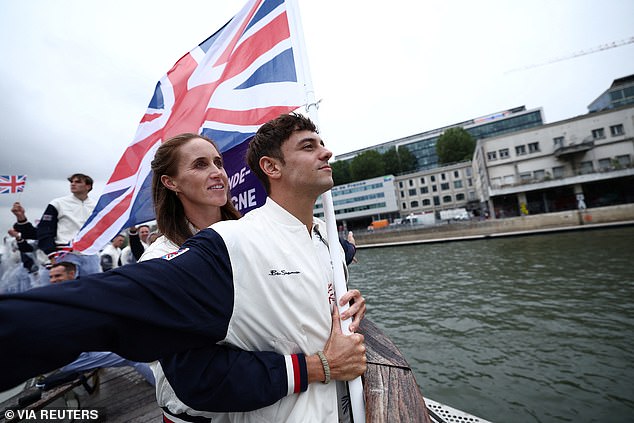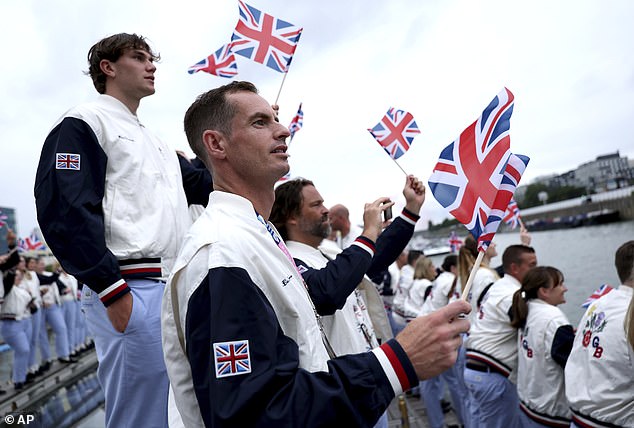This Opening Ceremony was chaotic and surreal but forget the critics - not even the torrential downpour could douse the joy of the return of the Olympics, writes OLIVER HOLT
- After the scarred pandemic Games of Tokyo, this was a fresh breath of life
The boats that carried the Olympians along the River Seine through the torrential rain and the dark of night were festooned with strings of lights that made them look like chariots of fire.
They sailed in a great flotilla of speedboats, water taxis and barges, past cardboard cut-outs of Madame Pompadour half-submerged in the river's dark waters.
They sailed beneath bridges thronged with acrobats and dancers and past guitarists high on balconies as if they had been transported here from the set of Mad Max: Fury Road.
The rain fell more and more heavily and drenched the pianist in his sequinned shirt as he sat at his grand piano on the Pont Royal and soaked the severed head of Marie Antoinette at a window overlooking the river.
With every chaotic minute of it, the opening ceremony for the Paris Olympics felt more and more like a movie made by Alain Resnais, Jean Cocteau or another of the great French surrealists.

Nothing could douse the joy felt at the return of the Olympics during the Opening Ceremony

After the scarred pandemic Games in Tokyo, the spectacle in Paris was a fresh breath of life
And as Tom Daley and Helen Glover held their Union Flags aloft on the double decker tourist boat that had been allotted to the Team GB delegation, and Andy Murray and the rest of the team waved madly at the spectators, it became evident that nothing was going to douse the joy felt at the return of the Olympic Games.
After the scarred pandemic Games of Tokyo three years ago, a Games denuded of spectators and much of its spirit, this was a fresh breath of life.
And even though the rain did not abate, those chariots that carried those beaming, cheering athletes, so thrilled to be Olympians at the start of a fortnight of sport's greatest show on earth, ploughed on through the choppy waters.
It is 100 years since Paris last staged an Olympics, the Olympics of Harold Abrahams and Eric Liddell, the Olympics immortalised by Hugh Hudson's film. And the passion and the joy of the athletes lit the way from one century to another.
So the flame was lit and raised into the sky in the form of a hot-air balloon and Celine Dion sang from the first landing of the Eiffel Tower and somehow the Games survived its first day.

The rain did not abate but boats carried beaming, cheering athletes down the River Seine

This year's Olympics survived its first day with sport's greatest show on earth now underway
It began with a series of arson attacks that crippled the French rail network and continued with the French president Emmanuel Macron getting a frosty reception as he boarded his boat.
None of it mattered. Not really. Because what a Games it will be. An Olympics where Murray, one of Britain's greatest sportsmen and greatest Olympians, will take to the red clay of Roland Garros and end his gilded career.
An Olympics where Simone Biles, the most decorated gymnast in history, will seek to somersault her way to redemption after the traumas she suffered in Tokyo when an attack of the 'twisties' ruined her Games.
An Olympics where Daley will continue to play the Peter Pan of diving, where Keely Hodgkinson will be Team GB's golden girl if she wins the women's 800m, where athletes in the 48 track and field events will be paid $50,000 for winning a gold medal, where Josh Kerr will attempt to become the new Sebastian Coe by winning the men's 1500m.
It is the Olympics which cast a pall over the once glorious career of Charlotte Dujardin, the Olympics which may anoint Antoine Dupont as the greatest rugby player ever, the Olympics where Noah Lyles will bid to become the face of the Games by winning the men's 100m and becoming the successor to Usain Bolt as athletics' saviour.
We should not expect too much from the Games, beyond the sport. The IOC likes to present itself as the conscience of the nations that have hosted the Olympics down the decades. It likes to suggest that it can tame warmongers and end avarice and soothe suffering, all by harnessing the purity and innocence of its army of sportsmen and women.

Andy Murray will take to the Roland Garros clay and the play the final sets of his gilded career

Simone Biles, the most decorated gymnast in history, will seek to vault her way to redemption
The IOC is as compromised as any of the nation states it professes to act as a moral compass for. That is why Russian athletes will be competing here in Paris despite what is happening in Ukraine, that is why 11 Chinese swimmers will be competing here despite being part of a wider group that failed drugs tests.
The Olympic movement does not act as an agent to force nation states to make the world a better place. The reality is that nation states use the Olympic movement as a propaganda tool. That is how the power dynamic has always worked and that is how it continues to work now.
So, even in the few Olympic Games that I have covered, the 2008 Olympics in Beijing might have heralded the start of the Chinese Century but it did little to encourage greater openness or fewer abuses of human rights.
The 2012 Games in London made us feel great about ourselves for a fortnight but that soon dissipated. Britain is more divided and polarised than it was 12 years ago. The 2016 Games in Rio did little to improve the lot of the impoverished majority who live in the favelas that pockmark the city.
None of this makes the Olympics a bad thing. It just reminds us to put some of its claims into perspective. It is a force for good but not a lasting cure for anything.
Now that the opening ceremony is over, we will be able to see the Olympics for what they are: a magnificent festival of sport that will throw up heroes and villains and drama and tears and laughter and rejoicing and feats you never thought possible.

For a fortnight, Paris will feel like an enchanted city where everyone comes together
Paris will feel like an enchanted city where everyone comes together, just as London did in 2012. Because at the end of everything, the Olympics is about athletes and their amazing stories and their superhuman determination and their joy and their despair. And their shot at immortality.
It is a 20-minute journey from the Gare Saint-Lazare in central Paris to the station called, simply, Le Stade, on the north-western outskirts of the capital. There, almost swallowed up in suburbia, is the Stade Yves-Du-Manoir, once known as Stade Olympique de Colombes.
It was here, 100 years ago, that the Games that provided the backdrop to Chariots of Fire took place, and even if much has changed, the footprint of the Tribune d'Honneur, the main stand, and its stone staircases and concrete steps, remain the same.
The stadium is staging the hockey events at these Olympics and a women's practice match between Belgium and Argentina was taking place on Thursday afternoon but it was still possible to hear the shouts of history echoing across the century.
A blue carpet covers what used to be the home straight of the cinder track that ran in front of the main stand and as you sit in one of its seats and gaze down, you can see Abrahams sprinting down the track in front of you, still one of only three British men to have won gold in the men's 100m final.
You can see Liddell, the devout Christian who had refused to compete in the 100m because the heats took place on a Sunday, charging down that back straight, head back, arms windmilling, as he won gold in the men's 400m.

Countless Olympians sailed through the city toward immortality and a dream
But it is not just because of Chariots of Fire that we remember the achievements of the men and women who wrote their names large in Olympic history.
Paavo Nurmi won the 1500m and the 5000m and two other golds in the cross country at those 1924 Olympics, too. His name is written even larger in the annals of Olympic history than either Abrahams or Liddell.
That is what those Olympians on those boats on the Seine were sailing towards. They were sailing beyond the security circus and the train chaos and the controversies over Russian athletes and Chinese dopers.
They were sailing towards immortality, towards being part of the same club as heroes like Abrahams, Liddell and Nurmi, Usain Bolt, Cathy Freeman, and Michael Phelps.
They were sailing towards a dream, the same dream that athletes chased in that stadium in Colombes a century ago and which they will chase over the next 16 days in the City of Light.








































































































